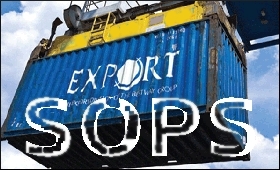|

|
Export sops: WTO compliance
|
|

|
|
| Top Stories |
 |
|
|
|
Bikky Khosla | 19 Sep, 2017
First, the good news. The August export figures have come as a relief in the background of declining growth witnessed by the sector in the previous few months. However, there is little scope for complacency. Experts have attributed this growth to spike in pre-GST order booking while raising concern over weak order booking position from October onwards. Additionally, the labour-intensive sectors' contribution to this growth is not encouraging. Meanwhile, another issue is recently gaining increasing attention: India, now qualifying as a middle-income country under WTO rules, may soon be urged to phase out its export subsidy regime.
Our per capita income has been holding well above $1000 since 2013, and according to WTO rules, if a country's per capita gross national income (GNI) crosses $1,000 for three consecutive years it has to stop its export incentives to all sectors. Only production-based subsidies are allowed. So, it can now reasonably be expected that India will be dragged to the WTO, sooner or later, for its export subsidy regime. In fact, we already have a taste of it due to the mounting pressure from some member states to stop our textiles export sops as the WTO does not allow a country--even with per capita below $1,000--to provide export sops to a sector global share of which crosses 3.25 percent for two consecutive years, a threshold the Indian textile sector has crossed in 2007.
It is true that WTO disputes usually take years to get resolved and an erring member gets enough time to make the requisite changes in its rules, but this should not be an excuse for inaction. Additionally, as abolition of export sops does not mean the end of all supports provided to the sector and is more about finding alternative schemes that are WTO compliant, it makes little sense to wait till the last minute. According to recent reports, the Centreâfinding it difficult to push the WTO deadline beyond next yearâis now preparing to replace the textile exports sops with indirect benefits. Such haste can often lead to a difficult transition. In contrast, early preparedness is definitely a better approach.
Meanwhile, the last week saw release of some important macro data. First, current account deficit widened to a four-year high of $14.3 billion in the first quarter as gold imports picked up ahead of implementation of GST. Second, trade deficit widened to $11.64 billion in August and this may push up CAD further. Third, industrial production grew a meagre 1.2 percent in July, dragged down by manufacturing. Fourth, August wholesale inflation accelerated to 3.24 percent and retail inflation to 3.36 percent, following which the RBI may hold the repo rate in the monetary policy review next month. These troubles warrant caution from our policy-makers.
I invite your opinions.
|
|
|
| |
|
|
|
|
|
|
|
WTO compliance
A.V. Chandran | Thu Sep 21 06:47:41 2017
If one and all deeply examine WTO compliance is benefited to dominating countries like US UK FRANCE RUSSIA GERMANY ITALY and other developed countries whereas it will not help to developing countries like India in view of currency culture. In short both currencies and material cost are varied whereas in terms of economics only material cost is varied and currency is firm in all respects hence bidding concept application will have direct repercussion and direct discouragement for developing countries as they are required to face various hurdles hence it is suggested that World One Currency (WOC) is implemented and included in the Pact of WTO for its smooth working in all respects otherwise it is one of the great blunder of the World!

WTO compliance
A V Chandran | Wed Sep 20 06:17:06 2017
WTO compliance with reference to Export/ Import process will have direct repercussion in all respects unless and until currency exchange is removed once for all and One currency is in force like World One Currency (WOC) on firm basis without any variation factor. In terms of Economics currency is not at all variable whereas application of it for costing of material will be variable. In short cost material will vary and currency will be firm. In the existing condition both currency and material cost are varied and it will have direct repercussion for developing countries like India. It is therefore suggested that one and all member countries may fall within WTO Compliance subject to application of WOC with befitting review mechanism to be followed by WTO enabling to do free Export/ free Imports without any hurdles but through competitive bidding process only.

|
|
|
|
|
|
|
| |
| Customs Exchange Rates |
| Currency |
Import |
Export |
US Dollar
|
84.35
|
82.60 |
UK Pound
|
106.35
|
102.90 |
Euro
|
92.50
|
89.35 |
| Japanese
Yen |
55.05 |
53.40 |
| As on 12 Oct, 2024 |
|
|
| Daily Poll |
 |
 |
| Do you think Indian businesses will be negatively affected by Trump's America First Policy? |
|
|
|
|
|
| Commented Stories |
 |
|
|
|
|
|
| |
|